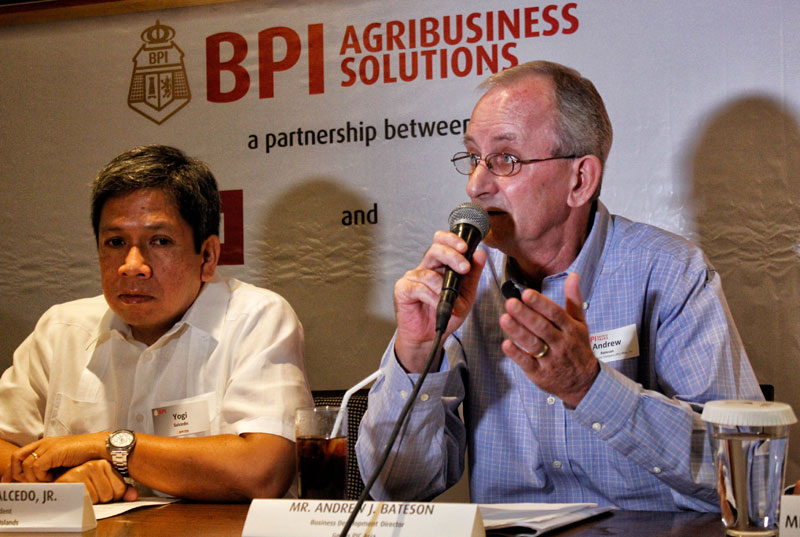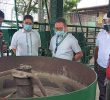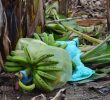
Mr. Alfonso Salcedo Jr. (left), BPI Executive Vice Presiden & Head of Corporate Banking, and Mr. Andrew Bateson, Business Development Director for Genus PIC Incorporated. (davaotoday.com photo by Medel V. Hernani)
Under this program, land titles covered by Emancipation Patents and Certificate of Land Ownership Award or even pre-patent are accepted as collateral with chattel mortgage on the equipment. Collateral, thus, don’t have to be commercial or residential lots, unlike before.
By MARILOU AGUIRRE-TUBURAN
Davao Today
DAVAO CITY, Philippines – The country’s oldest and one of the biggest commercial banks has made Davao City its Launchpad in the Southern Philippines for its new loan program that aims to “support commercial poultry raisers and hog farmers.”
Noting that Davao is the key city in Mindanao and also an agri-business base or where agricultural businesses thrive, the Bank of the Philippine Islands (BPI) formally launched the Agribusiness Solutions on Friday with top executives headed by Alfonso Salcedo Jr., Executive Vice President and Head of Corporate Banking.
“There’s an impression that banks don’t like to lend to agribusinesses. But that’s not true for the BPI because our history in agribusiness lending goes back in the ‘80s,” Salcedo said.
The BPI has its agricultural bank in the ‘80s which has gone through a lot of transitions before it was downsized and merged with the BPI proper and before it was converted into a Division, said Reymundo Castro, Senior Vice President and Division Head of Provincial Lending.
The program has been planned few years ago, Salcedo said, and they have decided to go “more aggressive” in lending and providing credit, especially in areas where “there’s a perceived lack of credit access.”
Salcedo pointed out they want to provide loans not just to the big plantations but also to small and medium size agribusinesses.
Under this program, land titles covered by Emancipation Patents and Certificate of Land Ownership Award or even pre-patent are accepted as collateral with chattel mortgage on the equipment. Collateral, thus, don’t have to be commercial or residential lots, unlike before.
“Not all banks are willing to take in their properties or their farm as collaterals and this has been the problem of our food growers. This is the main difference of BPI’s program,” Castro said.
The bank also hopes to extend “help” to farmers in farflung villages in Mindanao where it has a number of clients.
“When you’re extending credit to the smaller farmers, you will definitely hit the countryside and hopefully we would be able to help get those who were affected with (typhoons) Sendong and Pablo back to their feet and start their businesses again,” Salcedo said.
Typhoons Sendong and Pablo hit Mindanao in 2011 and 2012, respectively, damaging billions-worth in agriculture. BPI’s clients who were affected were offered grace periods.
Packages
BPI’s Agribusiness Solutions has three programs namely poultry enterprise, post-harvest operations and piggery farm business enterprise.
Poultry enterprise is for investors who are willing to put up an ideal amount of PHP 80 Million for a state-of-the-art poultry farm with 36,000 birds or one climate-controlled system house through a contract-growing arrangement.
National and local integrators are said to provide farm inputs such as feeds, medicines and technical assistance in order for the investors to grow the chickens.
Post-harvest operations, on the other hand, include feed milling, food storage, dressing plants, rice milling, fish farm operations, sugar farming and trading,
Meanwhile, piggery farm business enterprise is for those who want to venture on a PHP 200 M world-class 500 sow level piggery farm.
“In the past, we’ve been financing piggery and poultry but in the conventional type of doing it. This time, we’re going to upgrade our partners by using PIC (Pig Improvement Company) breeders and using state of the art modern facilities,” said Pearl Padilla, Assistant Vice President and head of Agribusiness Solutions.
Pork and chicken are said to be two of the major food staples in the country, with pork as the second largest agricultural product next to rice.
The bank’s executives said their packages are flexible, depending on the client’s capacity or how much they are willing to invest. They also have different types of program or financing packages.
Padilla said they can give as low as six percent rate for floating interest and as low as seven percent rate for fixed interest. For poultry, the interest is payable from five to six years and 10 years for piggery with two years grace period.
BPI’s current agribusiness portfolio is PHP 19 Billion with one-third coming from Mindanao.
Partnership
Andrew Bateson, Business Development Director for Genus PIC Incorporated, said their partnership with BPI will encourage and enable the participation of more producers in the modernization of livestock sector “which is crucial to the nation’s food security and the wellbeing of all Filipinos.”
He said the possibility of export in the hog industry is “a very exciting prospect” especially that the country has been officially recognized as foot and mouth disease (FMD) free.
FMD is a disease caused by a highly infectious virus that can infect people but affects them most by infecting livestock like cattle, pigs, sheep and goats, the MedicineNet (http://www.medicinenet.com) says.
The Office International des Epizooties (http://www.oie.int/en/) (OIE or the World Organisation for Animal Health), an intergovernmental organisation responsible for improving animal health in the world, recognized the Philippines as a member of the FMD free zone based on the provisions of the Terrestrial Animal Health Code of 2012.
Salcedo said the country is also free from the bird flu virus, things that would have the Philippines exporting chicken and pork instead of importing these agricultural products from other countries, citing that nine percent of the country’s pork consumption is imported and also a large percentage in chicken imports.
Being free from these animal diseases is an advantage to the pig production in the country, said Vincent Raphael Borromeo, General Manager of the PIC Philippines Inc., noting that neighboring countries like China, Vietnam and Thailand which has FMD keeps them from supplying into the Philippines, and thus, would open opportunities for Filipino farmers to supply into other countries.
“This is one of the things were really trying to work with local farmers to do, to open up the doors to the export market,” he said.
Inclusive growth, food security
Salcedo said the economy “has really been getting stronger” that’s why they looked at specific sectors ready for more aggressive credit access and they believe it is the agriculture sector, citing that 12 percent of the country’s Gross Domestic Product come from this sector as well as the 35 percent of the labor force.
He said they want to contribute to the country’s “inclusive growth and food security” amid the 27 percent of the total population living below the poverty line.
“With these statistics, you will not be able to make a dent in poverty alleviation if you don’t have a robust manufacturing sector and also agricultural sector,” Salcedo said. (Marilou Aguirre-Tuburan/davaotoday.com)
agribusiness, Bank of the Philippine Islands, BPI, davao









